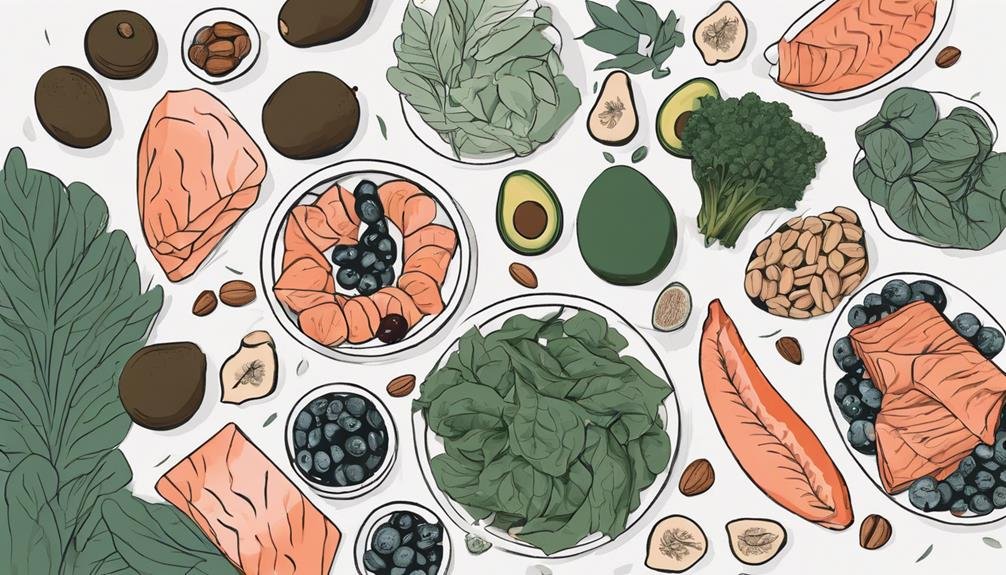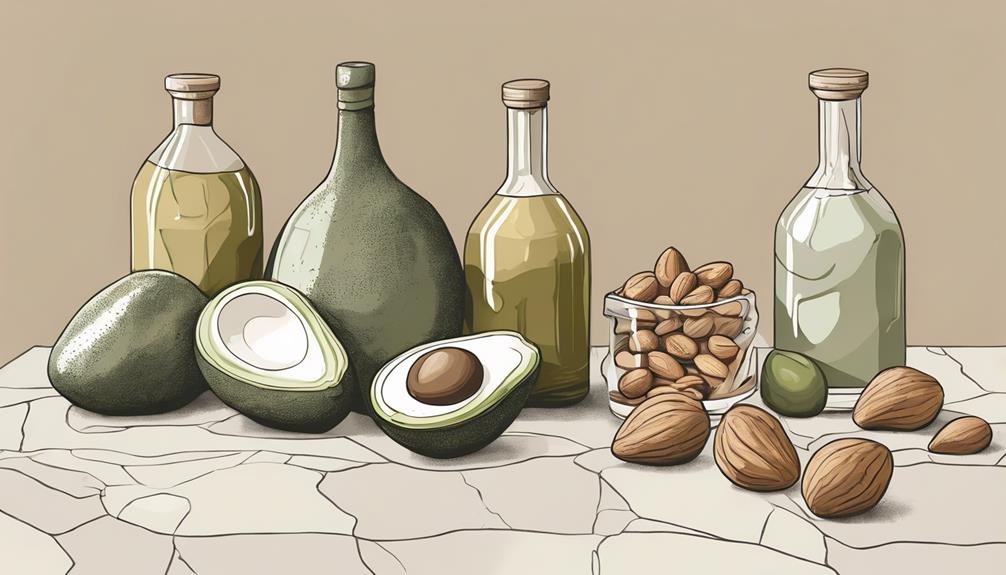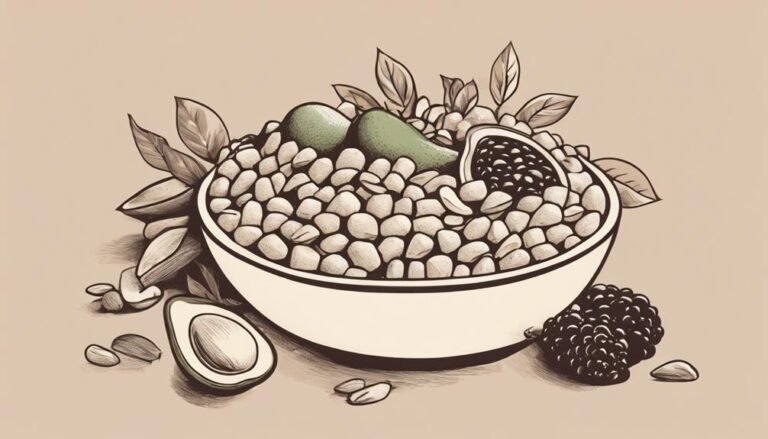Nutrition Tips for Men: Tackling the Midlife Shift
As you navigate midlife, focusing on your nutrition is key. Prioritize high-quality protein to maintain muscle mass and support your metabolism. Incorporate omega-3 fatty acids for heart health and healthy fats to balance hormones and enhance satiety. Don't forget vitamins like D and minerals like magnesium and zinc—they're vital for energy and immune function. Staying hydrated is essential, so aim for at least eight glasses of water daily. Planning your meals in advance can help you make balanced choices and minimize unhealthy snacking. There's more to explore to keep thriving during this life stage.
Key Takeaways
- Prioritize high-quality protein sources at every meal to maintain muscle mass and support metabolism as testosterone levels decline.
- Incorporate omega-3 fatty acids from fish or flaxseeds to reduce inflammation and support heart health during midlife.
- Ensure adequate vitamin D intake for bone health and immune function, especially through sunlight exposure and fortified foods.
- Stay hydrated by drinking at least eight glasses of water daily, and include hydrating fruits and vegetables in your diet.
Understanding Male Menopause
As you age, it's crucial to recognize that male menopause, often called andropause, can bring about hormonal changes that affect your mood, energy, and overall health.
You might notice symptoms like fatigue, irritability, and a decrease in libido, which can be unsettling. These changes stem from a gradual decline in testosterone levels, impacting your physical and emotional well-being.
It's crucial to pay attention to your body during this time, as these shifts can also lead to weight gain and muscle loss. By understanding andropause, you can take proactive steps to manage its effects.
Engaging in regular exercise, prioritizing sleep, and seeking medical advice can help you navigate this change more smoothly, ensuring you maintain a healthy and fulfilling lifestyle.
Key Nutrients for Men Over 40

Men over 40 need to focus on key nutrients that support hormonal balance, energy levels, and overall health.
As you navigate this stage of life, consider incorporating these essential nutrients into your diet:
- Omega-3 Fatty Acids: Found in fish and flaxseeds, they help reduce inflammation and support heart health.
- Vitamin D: Crucial for bone health and immune function, it can be obtained from sunlight and fortified foods.
- Magnesium: This mineral supports muscle function and energy production, and can be found in nuts, seeds, and leafy greens.
- Zinc: Important for hormone regulation and immune health, you can get it from meat, shellfish, and legumes.
Incorporating these nutrients can enhance your vitality and well-being as you age.
Importance of Protein Intake
Protein intake plays an essential role in maintaining muscle mass, supporting metabolism, and promoting overall health as you age.
As you shift into midlife, your body naturally loses muscle, making it vital to prioritize protein in your diet. Aim for high-quality sources like lean meats, fish, eggs, and plant-based options such as beans and lentils.
Incorporating protein in every meal helps sustain energy levels and prevents the dreaded weight gain that often accompanies aging. You might want to target around 1.2 to 2.0 grams of protein per kilogram of body weight, depending on your activity level.
Healthy Fats and Their Benefits

Including healthy fats in your diet can greatly enhance your overall well-being and support various bodily functions.
These fats are essential for maintaining energy levels, hormone production, and brain health. Here are four benefits of incorporating healthy fats into your meals:
- Heart Health: Monounsaturated fats can lower bad cholesterol levels and reduce heart disease risk.
- Weight Management: Healthy fats help you feel fuller longer, making it easier to maintain a healthy weight.
- Nutrient Absorption: Fats assist in absorbing fat-soluble vitamins A, D, E, and K.
- Brain Function: Omega-3 fatty acids support cognitive function and may help prevent age-related decline.
Embrace healthy fats like avocados, nuts, seeds, and olive oil for a balanced diet!
Hydration and Its Role
Staying hydrated is just as important as incorporating healthy fats into your diet, as it plays an essential role in maintaining overall health and bodily functions.
Water is necessary for digestion, nutrient absorption, and temperature regulation. As you age, your body's ability to retain water decreases, making it critical to drink enough fluids daily.
Aim for at least eight glasses of water or more if you're active or live in a hot climate. Don't forget about hydrating foods like fruits and vegetables, too.
Keep an eye out for signs of dehydration, such as fatigue or dry skin. By prioritizing hydration, you'll support your energy levels, cognitive function, and overall well-being during this important phase of life.
Meal Planning Strategies

Effective meal planning can greatly enhance your nutritional intake and simplify your daily routine. By organizing your meals in advance, you'll save time, reduce stress, and make healthier choices.
Here are four strategies to get you started:
- Set a Weekly Menu: Outline your meals for the week, focusing on balanced options that include proteins, whole grains, and plenty of fruits and vegetables.
- Batch Cook: Prepare large portions of meals and store them in individual containers. This way, you'll have quick and nutritious options ready to go.
- Grocery List: Create a shopping list based on your menu to avoid impulse buys and guarantee you have all the ingredients you need.
- Utilize Leftovers: Plan for leftovers to minimize waste and maximize your meal variety.
Questions
What Are the Signs of Nutritional Deficiencies in Men Over 40?
If you're over 40, watch for fatigue, hair loss, brittle nails, muscle weakness, and mood swings. These signs often indicate nutritional deficiencies. Monitoring your diet can help you maintain energy and overall well-being.
How Can Stress Affect a Man's Nutritional Needs?
Stress can greatly impact your nutritional needs. It often increases cravings for unhealthy foods, depletes essential nutrients, and can disrupt your digestive system. You might need to adjust your diet to counter these effects effectively.
Are There Specific Supplements Recommended for Midlife Men?
As the sun sets on your youthful days, consider supplements like vitamin D, omega-3 fatty acids, and magnesium. They support bone health, heart function, and stress management, giving you the strength to thrive in midlife.
How Does Sleep Impact Nutritional Health in Men?
Sleep impacts your nutritional health by regulating hormones that control appetite, metabolism, and cravings. When you're well-rested, you're more likely to make healthier food choices and maintain your energy levels throughout the day.
What Are Common Eating Habits to Avoid During Midlife?
During midlife, you should avoid skipping meals, excessive snacking on junk food, and relying too much on processed items. These habits can lead to weight gain and decreased energy, impacting your overall well-being.
Conclusion
As you navigate this midlife shift, picture yourself fueling your body with vibrant foods and strong nutrients.
Embrace the power of protein, healthy fats, and ample hydration to keep your energy soaring.
With thoughtful meal planning, you can transform your kitchen into a haven of health, where every bite brings you closer to wellness.
Remember, it's never too late to reclaim your well-being—so take charge, savor the journey, and relish in the new you!







